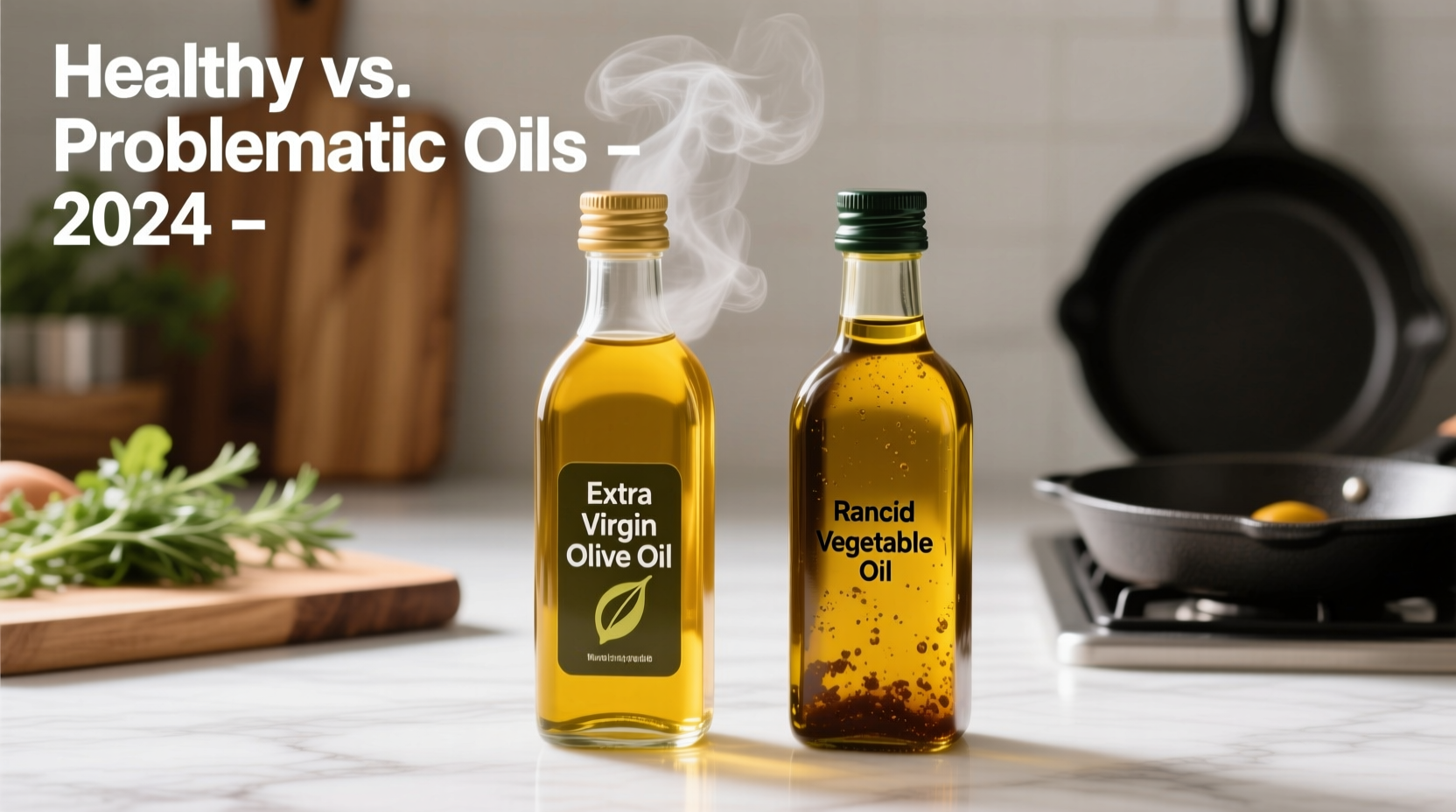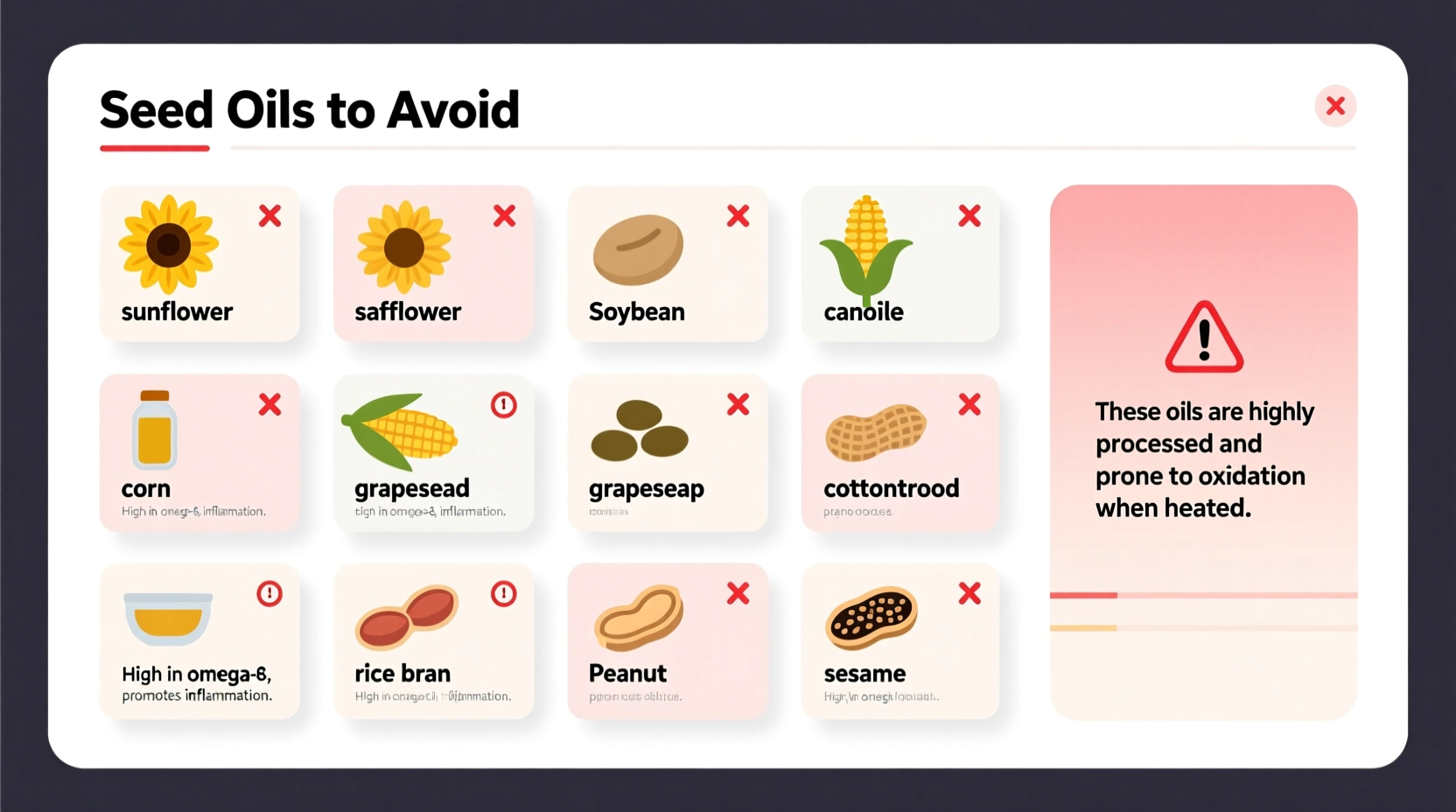Based on current nutritional science, the seed oils you should avoid for optimal health include soybean oil, corn oil, cottonseed oil, sunflower oil (high-linoleic varieties), safflower oil, and grapeseed oil. These oils contain excessive omega-6 fatty acids that promote inflammation when consumed in excess, potentially contributing to chronic diseases when used regularly in cooking and processed foods.
As a health-conscious home chef, you've probably heard conflicting advice about cooking oils. Some claim seed oils are heart-healthy while others warn they're dangerous. Let's cut through the confusion with science-backed facts that help you make informed choices for your kitchen.
Why Seed Oils Became Popular (And Why That Matters)
Understanding the historical context helps explain why problematic seed oils flooded our food supply. In the mid-20th century, food manufacturers embraced industrial seed oils as cheap alternatives to traditional fats. The timeline below shows their rapid rise:
| Time Period | Key Developments | Impact on Consumption |
|---|---|---|
| 1900-1940 | Cottonseed oil introduced as "vegetable shortening" | Negligible household use |
| 1940-1970 | Government subsidies for soybean/corn farming | 500% increase in consumption |
| 1970-2000 | "Heart-healthy" marketing campaigns begin | Becomes dominant cooking oil |
| 2000-Present | Research reveals inflammatory effects | Gradual consumer shift toward alternatives |
This historical shift matters because our bodies evolved consuming fats with a balanced omega-6 to omega-3 ratio (around 1:1 to 4:1). Modern diets using seed oils often reach ratios of 15:1 or higher, creating chronic inflammation that contributes to heart disease, diabetes, and autoimmune conditions according to research published in Experimental Biology and Medicine.
The Science Behind Why These Oils Harm Your Health
Seed oils contain high concentrations of polyunsaturated fatty acids (PUFAs), particularly omega-6 linoleic acid. When heated during cooking or processed in food manufacturing, these unstable fats oxidize, creating harmful compounds:
- Aldehydes - Toxic compounds linked to heart disease and dementia
- Free radicals - Damage cells and accelerate aging
- Advanced glycation end products (AGEs) - Contribute to chronic inflammation
The American Heart Association's own research, while traditionally promoting vegetable oils, acknowledges that excessive omega-6 consumption without balancing omega-3s creates inflammatory conditions. Harvard T.H. Chan School of Public Health confirms that replacing saturated fats with high-omega-6 seed oils doesn't improve heart health outcomes as previously believed.

Complete List of Seed Oils to Avoid
Here's the definitive list of seed oils that deserve limited use in your kitchen, along with why each poses concerns:
Soybean Oil
The most commonly used cooking oil in processed foods and restaurants. Contains approximately 51% omega-6 fatty acids. When hydrogenated (as in many margarines), it creates dangerous trans fats. The FDA has recognized concerns about oxidized soybean oil contributing to cardiovascular issues.
Corn Oil
Popular for frying due to its high smoke point (450°F), but contains 54% omega-6. Research from the University of California shows corn oil promotes tumor growth more than other fats in animal studies. Its industrial production involves hexane extraction, leaving trace solvent residues.
Cottonseed Oil
Common in snack foods and fried items, containing 52% omega-6. The Environmental Protection Agency notes cotton is one of the most pesticide-intensive crops, meaning cottonseed oil may contain pesticide residues unless specifically labeled organic.
Sunflower Oil (High-Linoleic)
Standard sunflower oil contains 68% omega-6. While often marketed as healthy, its high PUFA content makes it unstable for cooking. The National Institutes of Health warns that oxidized sunflower oil creates more harmful compounds than olive oil when heated.
Safflower Oil
Contains up to 78% omega-6 in its common form. Though sometimes sold as a "heart-healthy" option, its extreme omega-6 concentration makes it one of the most inflammatory seed oils available commercially.
Grapeseed Oil
Despite "natural" marketing, contains 70% omega-6. Its production involves chemical extraction from grape seeds, a winemaking byproduct. Research in the Journal of Agricultural and Food Chemistry shows grapeseed oil produces more toxic aldehydes than other oils when heated to typical frying temperatures.
Important Context: When These Oils Might Be Acceptable
Complete avoidance isn't always practical, especially with processed foods. Understanding context boundaries helps make informed compromises:
- Occasional restaurant meals - Don't stress about occasional exposure when dining out
- Cold applications only - Some high-oleic sunflower/safflower oils work in dressings (not cooking)
- Emergency situations - Better than no oil when alternatives aren't available
The key is making these oils the exception rather than your cooking standard. The FDA's Dietary Guidelines for Americans emphasizes replacing refined vegetable oils with healthier fats whenever possible for long-term health benefits.
Healthier Cooking Oil Alternatives You Should Use Instead
Transitioning to better fats doesn't mean sacrificing flavor or cooking performance. These alternatives provide stability and health benefits:
| Recommended Oil | Smoke Point | Omega-6 Content | Best Uses |
|---|---|---|---|
| Extra virgin olive oil | 320-375°F | 10% | Sautéing, dressings, low-heat cooking |
| Avocado oil | 520°F | 13% | High-heat frying, roasting |
| Coconut oil | 350°F | 2% | Baking, medium-heat cooking |
| Ghee (clarified butter) | 485°F | 4% | Searing, frying, sautéing |
| Sesame oil (toasted) | 350°F | 42% | Finishing, Asian cuisine (use sparingly) |
Notice the dramatically lower omega-6 content in these alternatives. For high-heat cooking, avocado oil and ghee provide exceptional stability without creating harmful compounds. When shopping, look for "high-oleic" versions of sunflower or safflower oil if you must use seed oils—they've been bred to contain more stable monounsaturated fats.
Practical Steps to Eliminate Harmful Seed Oils
Transitioning your kitchen doesn't require perfection—just consistent progress. Follow this actionable roadmap:
- Read labels - Check "ingredients" on all packaged foods (breads, crackers, sauces)
- Start with cooking - Replace your primary cooking oil first (e.g., swap soybean for avocado oil)
- Choose quality fats - Prioritize extra virgin olive oil, coconut oil, or ghee
- Limit processed foods - Most contain hidden seed oils
- Educate family members - Explain why you're making changes
Remember that even small changes make a difference. Replacing just your frying oil can significantly reduce your omega-6 intake. The World Health Organization recommends keeping omega-6 consumption below 6-10% of total calories for optimal health—most Americans currently consume 20% or more.
Debunking Common Seed Oil Myths
Let's address misconceptions that keep people using these problematic oils:
Myth: "Seed oils are heart-healthy because they're vegetable-based"
Fact: The term "vegetable oil" is misleading marketing—these come from seeds, not vegetables. Research in The American Journal of Clinical Nutrition shows no cardiovascular benefit from replacing saturated fats with high-omega-6 seed oils.
Myth: "All oils have the same calories, so it doesn't matter which I use"
Fact: While calorie counts are similar, the metabolic effects differ dramatically. Seed oils promote inflammation that leads to insulin resistance and weight gain, while healthier fats support metabolic health.
Myth: "I've used these oils for years with no problems"
Fact: Inflammation from seed oils works silently over decades. The CDC reports rising chronic disease rates correlate with increased seed oil consumption in the American diet.
Building a Healthier Kitchen, One Oil at a Time
Eliminating problematic seed oils represents one of the most impactful dietary changes you can make. Start with small, sustainable swaps rather than perfection. Your first step? Check your pantry right now for soybean, corn, or cottonseed oil—and consider replacing them with one healthier alternative this week.
Remember that cooking with intention transforms not just your meals, but your long-term health trajectory. By choosing stable, traditional fats over industrial seed oils, you're aligning with centuries of culinary wisdom backed by modern science.











 浙公网安备
33010002000092号
浙公网安备
33010002000092号 浙B2-20120091-4
浙B2-20120091-4